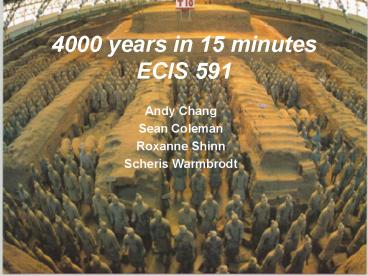4000 years in 15 minutes ECIS 591 - PowerPoint PPT Presentation
1 / 13
Title:
4000 years in 15 minutes ECIS 591
Description:
Earliest known Chinese writing. Practiced Human Sacrifices. Partilineal System. Qin. 221 B.C. ... High point in Chinese civilization. Buddhism declined and ... – PowerPoint PPT presentation
Number of Views:45
Avg rating:3.0/5.0
Title: 4000 years in 15 minutes ECIS 591
1
4000 years in 15 minutesECIS 591
- Andy Chang
- Sean Coleman
- Roxanne Shinn
- Scheris Warmbrodt
2
Dynasties- What are they?
- Xia c.2100 BCE - c.1600 BCE
- Xi Zhou 1066 BCE - 771 BCE
- Dong Zhou 770 BCE - 256 BCE
- Chun Qiu Shi Dai 770 BCE - 476 BCE
- Zhan Guo Shi Dai 475 BCE - 221 BCE
- Qin 221 BCE - 206 BCE
- Xi Han 206 BCE - 23 CE
- Dong Han 25 - 220
- San Guo (Three Kingdoms) 220 - 265
- Xi Jin 265 -
316 - Dong Jin 317 - 420
- Shi Liu Guo 304 - 439
- Nan-Bei Zhao 420 - 581
- Sui 531 - 613
- Tang 618 - 907
- Wu Dai Shi Guo 907 - 979
- Bei Song 960 - 1127
- Nan Song 1127 - 1279
- Liao 907 - 1125
- Xi Xia 1032 -
1227 - Jin 1115 - 1234
- Yuan (Mongol) 1279 - 1368
- Ming 1368 - 1644
- Qing (Manchu) 1644 - 1911
- Republic of China 1912 - 1949
- People's Republic of China 1949 -
3
Xia 2200 B.C.-1500 B.C.
- Mythical, not proven
- Slaves and maidservants were buried alive
- Ended when Xia ruler treated people badly
- Silk was produced as early as 2500 BC
4
Shang 1700 B.C.-1027 B.C.
- Bronze-working civilization
- Earliest known Chinese writing
- Practiced Human Sacrifices
- Partilineal System
5
Qin221 B.C. 206 B.C.
- China unified under first emperor Shih Huang-ti
- Standardized written language and money system
- Mass construction of roads and canals
- Great Wall is built by joining existing walls
- Farmers are the backbone of economy
- Records and art work destroyed, limit new ideas
- Giant clay army tomb constructed
6
Early or Western Han 206 B.C. 9 A.D.Later or
Eastern Han 25 A.D. 220 A.D.
- Learning and education are important
- Teachings of Confucius followed
- Buddhism introduced from India
- Porcelain produced
- Import Silk to Europe
- Dictionary compiled in 100 A.D.
- Xin Dynasty 9 A.D. 24 A.D.
7
Period of Disunion 220 A.D. 588 A.D.
- Three Kingdoms, division into three states
- Wei 220 265, became dominant
- Shu 221-263
- Wu 229 280
- Confucianism eclipsed, Buddhism influence
- Chin 265 420
- Southern Dynasties (Song, Qi, Liang, Chen)
- Northern Dynasties (Wei, Qi, Zhou)
8
Sui 581 A.D. 618 A.D.
- Very short dynasty
- Reunification, centralized government
- Taxes reduced for common people
- Buddhism and Taoism favored over Confucianism
- Great Wall refortified
- Canal system established, became Grand Canal
9
Tang 618-907
- Emperor Tai Zong Tang was the founder
- High point in Chinese civilization
- Buddhism declined and Confucianism more popular
- Equal land allotments to the male population
- Silk contributed to trade and prosperity
- The famous Three Color Pottery
- Only female emperor in Chinese history
- 24 emperors during this dynasty
10
Song 969-1279
- Taizu Song was the founder
- Greater concentration of power
- Literature continued to flourish
- Mercantile class arose
- Printing and education spread
- Weak military
11
(Mongol Reign) Yuan 1279-1368
- Khubilai Khan was the first emperor
- Yuan was an alien dynastic rule of China
- The Mongol empire was vast
- Mongols ruled as if they were Chinese
- Marco Polo visited
- Invention of Beijing Opera
12
Ming 1368-1644
- Founded by a Han Chinese peasant
- Population around 100 million people
- Achieved most satisfactory civilization
- Wars with Mongols
- Harassment by Japanese
- Manchus took Beijing from North
13
Qing 1644-1911
- Continued Confucian system
- Han Chinese not allowed into Manchu
- Protect from internal rebellion/ foreign invasion
- Unable to foresee future challenges
- Collapse of last imperial dynasty































